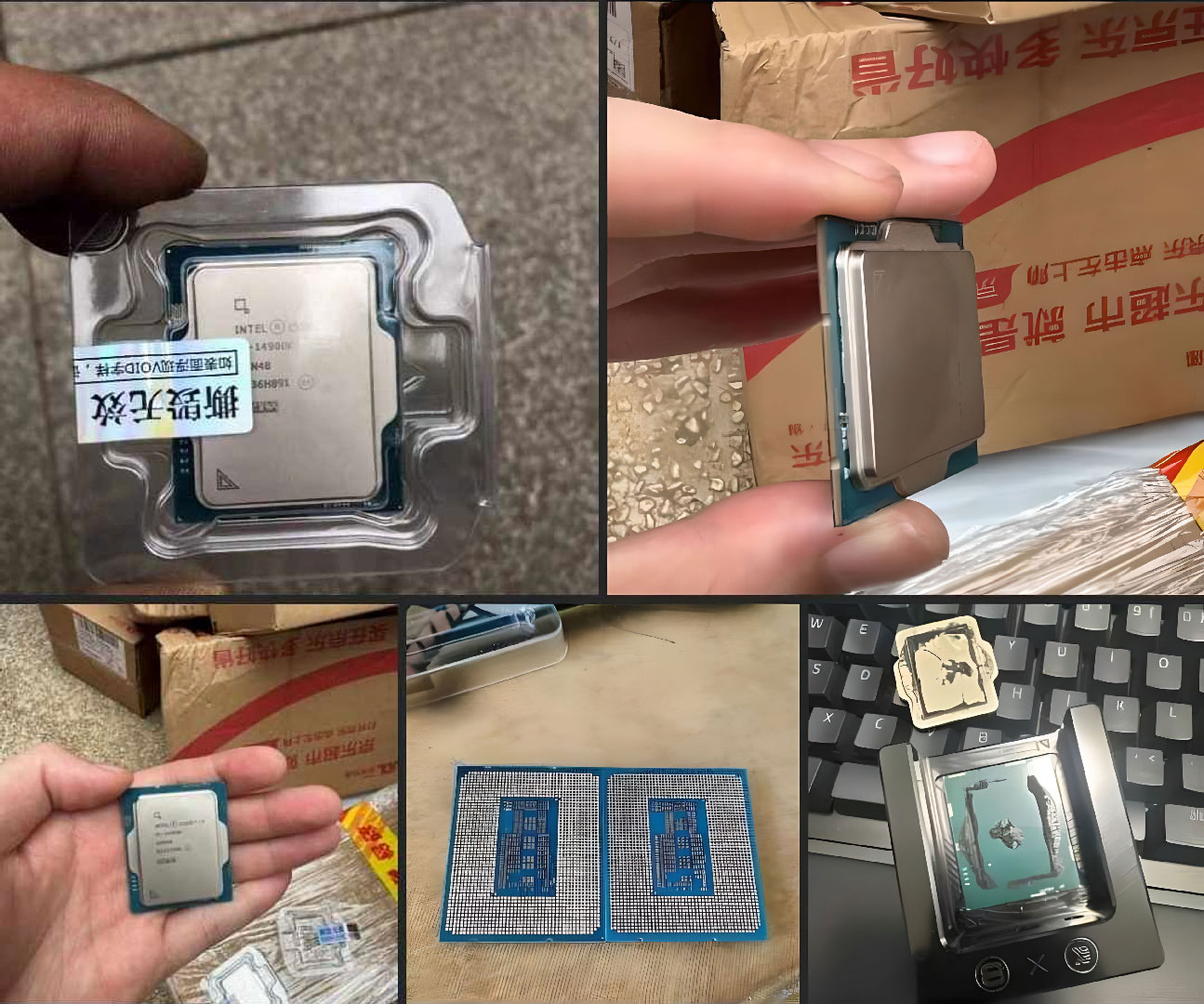Overclocker sold a die-less Core i9-14900K in China — product suffered from serious silicon deficiency
Delidding the stone-dead chip revealed the terrible truth.

One of the world’s leading overclockers has fallen victim to a Chinese CPU scammer. Hong Kong’s HKEPC shares the sorry tale of overclocker Safedisk, who bought a non-retail packaged Intel Core i9-14900K, which was stone dead. To investigate the issue with the chip, the South Korean OC champion - ranked third worldwide - delidded the CPU to find it was seriously silicon deficient. There was just an empty space under the IHS where the CPU die was supposed to be.
According to HKEPC’s retelling of the Safedisk 14900K swindle, The Korean overclocker acquired a ‘loose chip’ or ‘bulk pack’ Intel Core i9-14900K from a mainland China dealer. We are sure Safedisk isn’t short of CPU samples, but perhaps his curiosity was aroused by the pricing, packaging, or product description.
With the chip in hand, things looked pretty suspicious from the start. According to the machine translation of the HKEPC post, the CPU arrived in a blister pack with a sticker signaling that the warranty would be void if the pack were opened... That’s a message that doesn’t demonstrate a lot of confidence in a product and is surely not Intel’s official policy.
Installing the CPU resulted in a no-boot situation. We are sure Safedisk wasn’t surprised at this point. Perhaps such an experienced overclocker may have even been able to tell the silicon was missing from the chip weight.
Faced with such a resolutely dead CPU, which looked pretty normal from the outside, Safedisk decided to physically check under the hood. A moment or two with a delidding tool revealed a big surprise. Where the silicon die usually resides, affixed to the green substrate under the prized-off IHS, there was a vacant space. This isn't how the silicon lottery is supposed to work.
We have published several reports outlining dodgy dealings by electronics retailers and/or online marketplaces, very often in China. Buyers really have to beware of spending their hard-earned cash on offers from sellers with no reputation, no retail store presence, or simply hawking things that seem too good to be true. Count this as another warning, and, of course, scammers live and do their dastardly deeds worldwide - not just in China.
Lastly, we hope Safedisk didn’t feel too stung and didn’t lose much money from this recent 14900K retail experience.
Get Tom's Hardware's best news and in-depth reviews, straight to your inbox.

Mark Tyson is a news editor at Tom's Hardware. He enjoys covering the full breadth of PC tech; from business and semiconductor design to products approaching the edge of reason.
-
TerryLaze ReplyOverclocker sold a die-less Core i9-14900K in China —
Did he buy or sell the CPU in question?!
You are saying both. -
PEnns There were so many red flags the highly acclaimed overclocker failed to notice!Reply
Here is a nugget: "the CPU arrived in a blister pack with a sticker signaling that the warranty would be void if the pack were opened". ....I guess the CPU was meant to be kept in said sad packaging and admired from a distance...!!
PS: I didn't realize there is a ranking for the top (or lowest) overclocker on this planet! -
35below0 Reply
No, seriously. I read it as if someone in China was sold a chip from an overclocker.TerryLaze said:Did he buy or sell the CPU in question?!
You are saying both.
I know it's fashionable to hate on click-bait headlines from TH, but this one deserves a roasting. -
Li Ken-un Reply
Obviously ambiguous to stymie the development of our future AI overlards, which are training on freely readable content like TH at this very momentTerryLaze said:Overclocker sold a die-less Core i9-14900K in China —
Did he buy or sell the CPU in question?!
You are saying both. -
punkncat I have seen and am aware of 'display only' type packaging but have never specifically seen it with CPU's. Quite common with phones and other small electronics that are meant to be the pick it up and touch it type where theft is highly possible.Reply -
FunSurfer The Ferengi Rules of Acquisition:Reply
Rule #1: Once you have their money, never give it back! -
The Historical Fidelity That seller is probably reading this article thinking: “HAHA GOT ‘EM!”Reply -
waltc3 Several decades back, when Intel was the main force in the CPU markets and AMD had yet to begin to hit its stride, Intel began clock-locking its CPUs. The reason was widespread bootlegging in China and elsewhere, where the bootleggers would take low-cost Intel CPUs, silkscreening them to deceptively show that they were more costly Intel CPUs when the fact was that the low-end CPUs were being overclocked and overvolted by the resellers. In reaction, Intel put out software to detect the fake CPUs and began locking CPU clocks and selling tiers with expense predicated on MHz.Reply
I remember it so well, and it seems so comical to me now, because I was teed off at Intel for doing this because I liked to overclock my x86 CPUs & Celerons 100%, like you could easily do with those CPUs back then (16MHz & 32MHz, etc) and I saw it as a cash-grab from Intel. How dare Intel mess up my OC'ing party? The nerve! People were supposed to be able to massively overclock their CPUs effortlessly, and so on. But since then, the magnitude of the CPU bootlegging problems have grown exponentially, along with the general CPU markets. I am somewhat surprised to see it still going on today! Selling dud CPUs is even worse.
